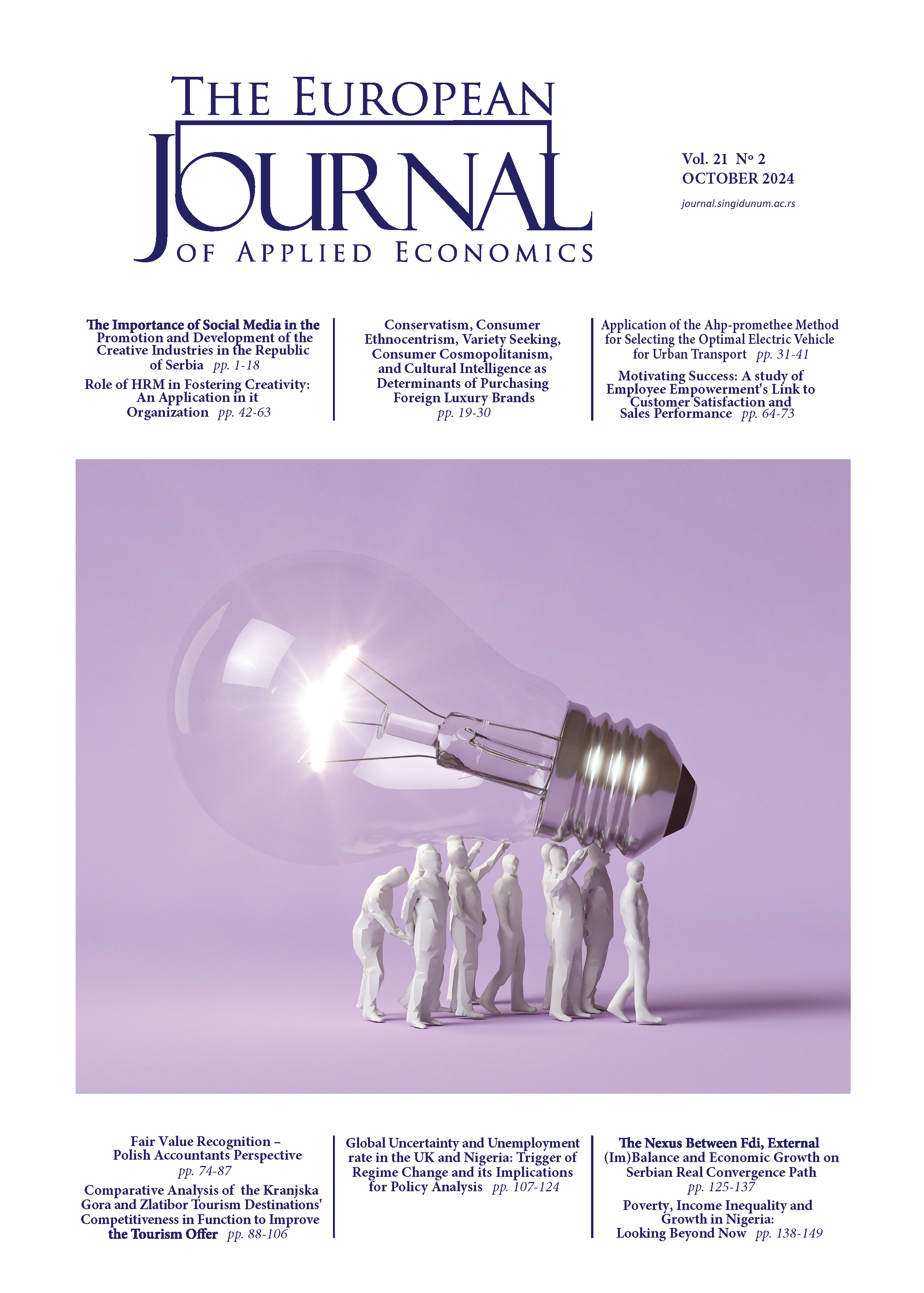FAIR VALUE RECOGNITION – POLISH ACCOUNTANTS PERSPECTIVE
Abstract
The paper aims to explore the attitude of accountants to fair value measurements. The sample consists of Polish accountants with various working places and practical experiences. The authors assumed no difference in fair value recommendations between accountants. The authors considered a difference in the practical use of fair value models in accountants with more extended experience and the workplace. The method of analysis of sources (literature), deductive reasoning and survey research were used. The study used a questionnaire addressed to Polish accountants. The results confirmed that most accountants, regardless of gender, working place or length of experience, recommended a fair value method for improving the credibility of financial figures. Despite the recommendation, more experienced accountants and accountants working in accounting offices mostly use historical cost methods instead of fair value methods. The main restriction concerns that the quantitative study was preliminary and refers only to Polish accountants. The article fills the research gap in preferable valuation methods regarding the gender of the person responsible for accounting.
References
Aversano, N., Di Carlo, F., Sannino, G., Tartaglia Polcini, P., & Lombardi, R. (2020). Corporate social responsibility, stakeholder engagement, and universities: New evidence from the Italian scenario. Corporate Social Responsibility and Environmental Management, 27(4), 1892–1899. https://doi.org/10.1002/csr.1934
Baudot, L. (2018). On Commitment Toward Knowledge Templates in Global Standard Setting: The Case of the FASB-IASB Revenue Project. Contemporary Accounting Research, 35(2), 657–695. https://doi.org/10.1111/1911-3846.12396
Benston, G. J. (2006). Fair-value accounting: A cautionary tale from Enron. Journal of Accounting and Public Policy, 25(4), 465–484. https://doi.org/10.1016/j.jaccpubpol.2006.05.003
Bhat, G., Frankel, R., & Martin, X. (2011). Panacea, Pandora’s box, or placebo: Feedback in bank mortgage-backed security holdings and fair value accounting. Journal of Accounting and Economics, 52(2–3), 153–173. Scopus. https://doi.org/10.1016/j.jacceco.2011.06.002
Bobek, D. D., Hageman, A. M., & Radtke, R. R. (2015). The effects of professional role, decision context, and gender on the ethical decision making of public accounting professionals. Behavioral Research in Accounting, 27(1), 55–78.
Cimirotić, R., Duller, V., Feldbauer-Durstmüller, B., Gärtner, B., & Hiebl, M. R. W. (2017). Enabling factors that contribute to women reaching leadership positions in business organizations: The case of management accountants. Management Research Review, 40(2), 165–194. Scopus. https://doi.org/10.1108/MRR-10-2014-0233
Cohen, J. R., Dalton, D. W., Holder-Webb, L. L., & McMillan, J. J. (2020). An Analysis of Glass Ceiling Perceptions in the Accounting Profession. Journal of Business Ethics, 164(1), 17–38. Scopus. https://doi.org/10.1007/s10551-018-4054-4
Czaja-Cieszyńska, H., & Mućko, P. (2022). Uproszczenia wybranych zasad (polityki) rachunkowości w mikro-i ma\lych jednostkach w Polsce–regulacje prawne i b\lędy poznawcze. Zeszyty Naukowe Uniwersytetu Ekonomicznego w Krakowie/Cracow Review of Economics and Management, 1 (995), 137–153.
Gavious, I., Segev, E., & Yosef, R. (2012). Female directors and earnings management in high-technology firms. Pacific Accounting Review, 24(1), 4–32. Scopus. https://doi.org/10.1108/01140581211221533
Georgiou, O. (2018). The Worth of Fair Value Accounting: Dissonance between Users and Standard Setters. Contemporary Accounting Research, 35(3), 1297–1331. Scopus. https://doi.org/10.1111/1911-3846.12342
Hitz, J.-M. (2007). The Decision Usefulness of Fair Value Accounting – A Theoretical Perspective. European Accounting Review, 16(2), 323–362. https://doi.org/10.1080/09638180701390974
Hossain, S., Chapple, L., & Monroe, G. S. (2018). Does auditor gender affect issuing going-concern decisions for financially distressed clients? Accounting and Finance, 58(4), 1027–1061. Scopus. https://doi.org/10.1111/acfi.12242
Ittonen, K., Vähämaa, E., & Vähämaa, S. (2013). Female auditors and accruals quality. Accounting Horizons, 27(2), 205–228. Scopus. https://doi.org/10.2308/acch-50400
Kabalski, P. (2021). Księgowość w Polsce jako zawód kobiecy. Skala, przyczyny, okoliczności, skutki.
Kabalski, P., & Szwajcar, J. (2015). Feminizacja studiów w zakresie rachunkowości w Polsce–przyczyny i skutki. Zeszyty Teoretyczne Rachunkowosci, 81(137).
Krambia-Kapardis, M., & Zopiatis, A. (2009). Female accountants in partnership positions: Persona nongrata? Research in Accounting in Emerging Economies, 9, 265–285. Scopus. https://doi.org/10.1108/S1479-3563(2009)0000009012
Laux, C., & Leuz, C. (2009). The crisis of fair-value accounting: Making sense of the recent debate. Accounting, Organizations and Society, 34(6), 826–834. https://doi.org/10.1016/j.aos.2009.04.003
Liao, L., Kang, H., & Morris, R. D. (2021). The value relevance of fair value and historical cost measurements during the financial crisis. Accounting and Finance, 61(S1), 2069–2107. Scopus. https://doi.org/10.1111/acfi.12655
Lupu, I. (2012). Approved routes and alternative paths: The construction of women’s careers in large accounting firms. Evidence from the French Big Four. Critical Perspectives on Accounting, 23(4–5), 351–369. Scopus. https://doi.org/10.1016/j.cpa.2012.01.003
Maroun, W., & van Zijl, W. (2022). Fair value accounting: Epistemic commitment and resistance. Accounting Forum, 46(3), 215–240. Scopus. https://doi.org/10.1080/01559982.2021.1941568
Masztalerz, M. (2018). IS ACCOUNTING IN POLAND A WOMAN? Prace Naukowe Uniwersytetu Ekonomicznego we Wrocławiu, 503, 326–335. https://doi.org/10.15611/pn.2018.503.28
Napier, C. J., & Stadler, C. (2020). The real effects of a new accounting standard: The case of IFRS 15 Revenue from Contracts with Customers. Accounting and Business Research, 50(5), 474–503. https://doi.org/10.1080/00014788.2020.1770933
Penman, S. H. (2007). Financial reporting quality: Is fair value a plus or a minus? Accounting and Business Research, 37(sup1), 33–44. https://doi.org/10.1080/00014788.2007.9730083
Whittington, G. (2008). Fair Value and the IASB/FASB Conceptual Framework Project: An Alternative View. Abacus, 44(2), 139–168. https://doi.org/10.1111/j.1467-6281.2008.00255.x


